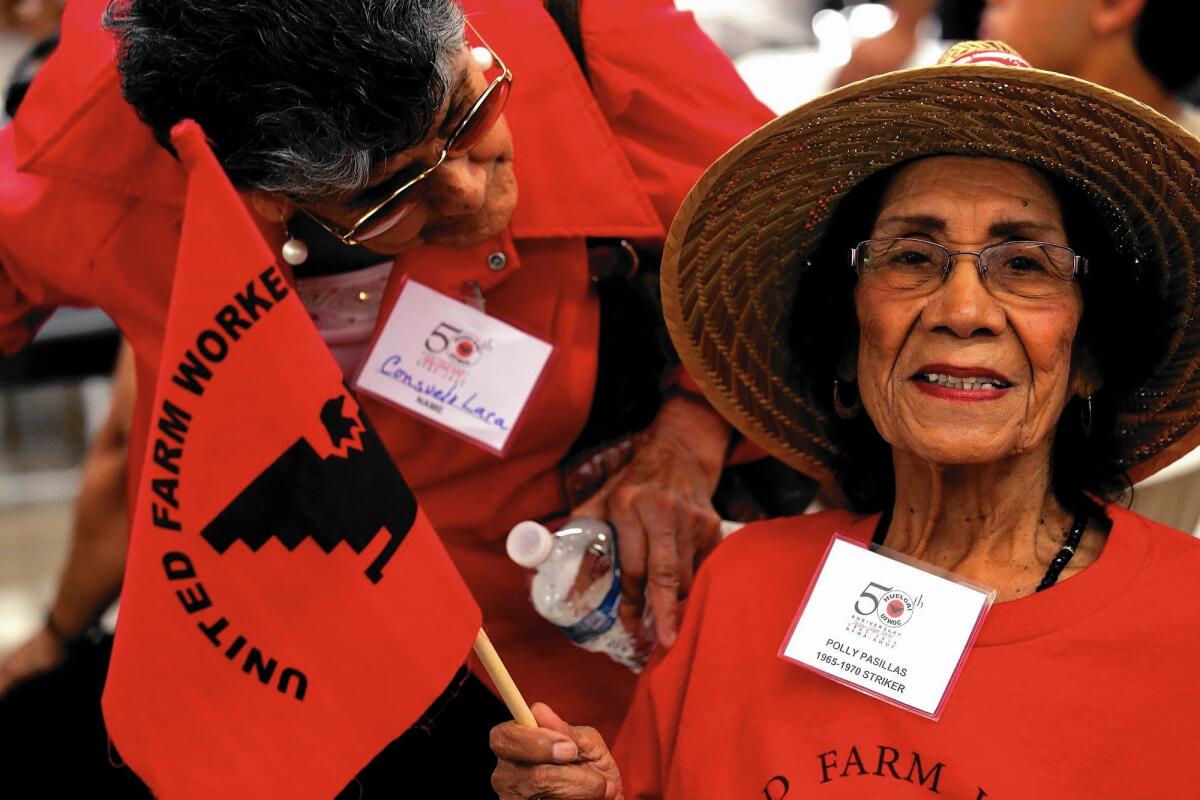Looking back 50 years after Delano farm workers’ grape strike

- Share via
reporting from DELANO, Calif. — Danny Flores carried his two young sons to the car at 5 a.m. and drove from Long Beach to Delano.
Maybe the brothers would be too young to understand the speeches at the 50th anniversary of the Delano grape strike, but when Flores, 53, was a 12-year-old carrying a United Farm Workers flag during later protests, he didn’t understand the speeches.
“I just knew that my older brothers and sisters followed the crops and lived in our car and sometimes they got really sick and they didn’t have medicine,” he said.
“I was skinny and I’d hold that sign all day Saturdays and the wind would blow and my hands would hurt so bad. But I wouldn’t let go.
------------
FOR THE RECORD:
Grape strike: In an earlier version of this article, Lorraine Agtang’s age was given as 54. She is 64.
------------
“Now I just want my sons to know that things stay ugly unless you are the change.”
He led Rey, 5 and David, 6, to a photograph of a young Cesar Chavez.
“Look at him, sons. Look at him. That was Cesar Chavez, and he was a good man.”
In September 1965, the Manongs — Filipino elders — walked out of the grape fields around Delano demanding more humane conditions for workers. Cesar Chavez and his National Farm Workers Assn. soon joined them. It was the beginnings of a civil rights movement and would lead to the formation of United Farm Workers.
“The farmers had always played the Filipino and Mexican workers against each other,” said Lorraine Agtang, 64, whose father was Filipino and mother Mexican. “So for me that day made me whole.”
Still, Agtang thought that “all roads out of Delano led to more grape fields and that my future was set working in the fields and having seven children.”
But at 21 she got a job in the retirement village in Forty Acres where the Manong and other former laborers lived.
“These men were in their 70s and they still walked picket lines. I was a quiet girl and they taught me about being strong and standing up when you’re needed,” she said. “They set who I was for the rest of my life. They’ve all died but I can feel them here today.”
She looked at her hands and pointed out a scar.
“I got that tying grape vines — I was like 8 years old. Everything would be different if it wasn’t for what they did 50 years ago.”
Hours after a program that included Robert F. Kennedy Jr. and UFW leaders and drew 1,000 people to the union’s early headquarters, now a National Monument, members of a boisterous crowd still hugged old friends and told stories they never wanted to forget.
Polly Pasillas, 88, pounded a table as she reenacted Cesar Chavez saying the United States of America gave them the right to strike.
“I was there,” she said. “There were so many policemen. I was scared. But I am so happy I was there.”
A man with a guitar led a singalong of “Me and Bobby McGee.” It was Kris Kristofferson, the entertainer and son of Swedish farmers, who shared a stage with Chavez for decades.
Three Baca sisters from a fourth-generation California family sat outside in the shade and toasted their mother, Jennie Baca Rios.
Baca Rios had ten children — five boys and five girls. They lived in a housing project outside Sacramento. The children worked in the tomato fields — but in shifts so they could also study. The youngest was a shoeshine boy by age 7.
Baca Rios used the activism training she received from the UFW to get a playground built at the project and to persuade a local store to take credit and not carry boycott grapes. She had a condition that made her skin lose pigment.
“She was spotted like a Jersey cow,” said Lydia Baca. “She didn’t speak good Spanish, but she was one strong lady.”
There was always room at their table for more children.
“She had 10 kids and a tiny paycheck, but she’d always bring in 10 more little kids for dinner,” said Mary Baca Dominguez.
Baca Rios’ children call themselves the G-1’s. Their generation worked as maids and bus drivers and other jobs away from the fields. Almost all of their children and grandchildren — more than 100 of them — have college degrees.
It’s a diverse family.
“We have black, brown, white, gay, you name it, and we all love each other,” said Baca Dominguez.
Near the end of Jennie Baca Rios’ life, her brother was visiting and looked at the family photos on her refrigerator.
“He said, ‘What kind of zoo is this?’
“My mother said ‘Get out. That’s my family.’ He got booted and booed,” said Baca Dominguez.
“So you can see why we had to be here today. We’re marching for Jennie and the others who broke the cycle and still keep us all together.”
More to Read
Sign up for Essential California
The most important California stories and recommendations in your inbox every morning.
You may occasionally receive promotional content from the Los Angeles Times.














